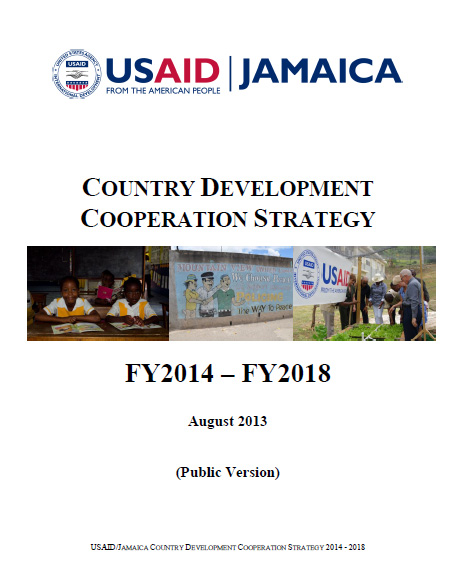Jamaica is a small island nation, creating an even higher level of interdependence between the environment, economic and social systems. There are three major challenges to social cohesion, which undermine and threaten citizen security and overall wellbeing.
Jamaica - Country Development Cooperation Strategy ![]() (pdf - 838k)
(pdf - 838k)
To address threats and strains on growth and stability, Jamaica must become a more cohesive and inclusive country. Social cohesion is a driving force for political change and a mechanism that consolidates democratic values into social institutions, thereby strengthening government, public, and private sectors while building confidence among citizenry in their country’s ability to thrive. It is well known that functional, effective institutions both determine and result in social cohesion, which impacts the economic wellbeing of a society. In the 2010 Index of Social Cohesion, Jamaica ranked 56th, behind Cuba and El Salvador.
Jamaica is a small island nation, creating an even higher level of interdependence between the environment, economic and social systems. There are three major challenges to social cohesion, which undermine and threaten citizen security and overall wellbeing. They are: 1) a lack of climate change resilience and sustainability; 2) high levels of crime and violence; and, 3) the prevalence of HIV/AIDS. USAID/Jamaica is committed to assisting the country in focused areas for investment, as a complement to efforts by other USG agencies, international development partners and through public-private partnerships. Developing integrated programming with strong linkages between the sectors, we will maximize resource impact while also preparing our local partners and the Government of Jamaica (GOJ) to assume responsibility for projects, with a goal to transition some activities to total local ownership.
The first of these interdependent challenges relates to geography. First, as a Caribbean nation, Jamaica is highly vulnerable to the impacts of extreme weather and global climate change. Hurricanes and tropical storms have had significant negative impacts on economic activities, property, human welfare and natural resources. Over the past decade, Jamaica experienced nine hydro-meteorological natural disaster events causing damages estimated at J$111.8 billion (about U.S.$1.45 billion). The greatest impact occurred with Hurricane Ivan in 2004 which resulted in J$36.9 billion of damage and loss, approximately 8% of the country’s GDP2. The country recognizes that economic concerns have led to a scarcity of resources to fund environmental initiatives when compared to matters of security and other social sector services3. Disasters always have significant implications for public finance, increasing expenditure, reducing domestic revenue and in turn resulting in increased domestic and external borrowing.
Second, as a small island developing state (SIDS), Jamaica’s economy is largely focused on exports and activities tied to external markets. Major economic sectors, including agriculture, tourism, and mining, also suffer from a lack of environmental or economic sustainability due to insufficient regulation, policy, planning and enforcement. Moreover, these sectors are negatively impacted by the high cost of electricity, which exceeds USD $0.40 per kilowatt hour4. Jamaica’s high electricity tarrifs are a strong drag on its overall economic growth, weighing on competitiveness and burdening private consumers and citizens. A 2010 World Bank assessment states that Jamaica would not be able to generate enough internal and external financing to replace infrastructure and goods if struck by a category 4 or 5 hurricane5. Jamaica’s economy, burdened by heavy debt, exposed to elevated risk of natural disaster, and unable to finance investment, is likely to languish and experience upward pressure on crime, violence, and trade in illicit goods, unless it can improve its ability to plan for sustainability, resiliency, and growth.









Comment
Make a general inquiry or suggest an improvement.